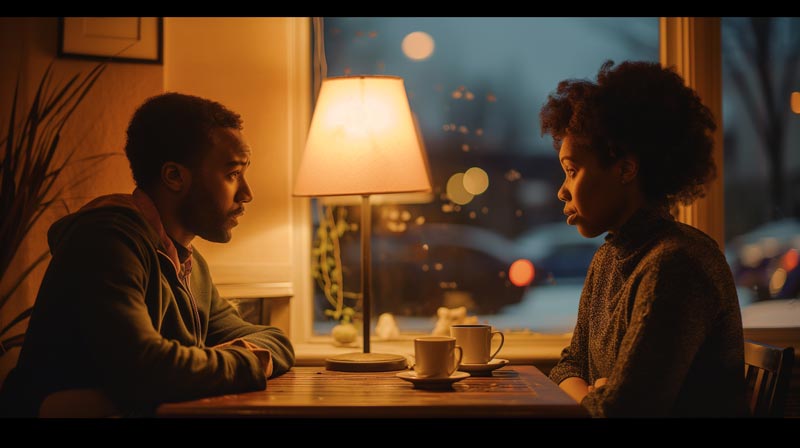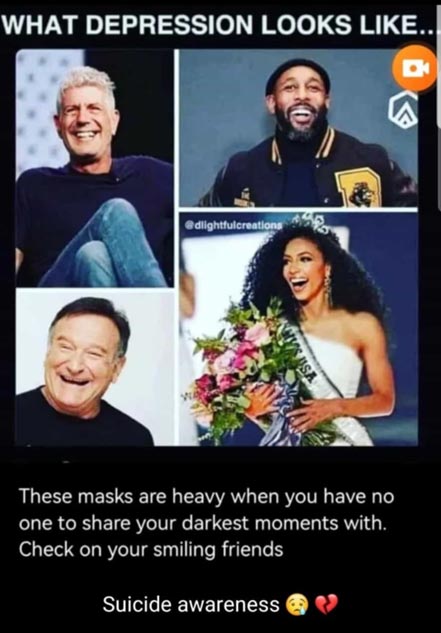Depression and suicide often stem from life’s complex emotions and encounters. The profound connection and revelation moments frequently lead us on paths of introspection and healing.
Taylor Swift’s new album and her cathartic storytelling method inspired me to express my feelings about a recent encounter. Despite writing down my thoughts some time ago, I hesitated to publish them, held back by an unfamiliar fear. Usually, I freely express my thoughts, but this time, something stopped me.
As a 45-plus-year-old man with East London street cred to maintain, I wouldn’t call myself a #Swiftie. Yet, the mastery displayed in her storytelling is undeniable. The process of releasing and finding relief from strong or repressed emotions tied to past relationships, trauma, and personal experiences has helped me manage my depression and suicidal thoughts. This realisation compelled me to share my story.
In February 2004, an encounter served as a mirror to my soul, reflecting the myriad challenges and silent battles we each carry. This unexpected yet fated meeting offered a glimpse into the shared human condition of seeking solace amidst despair.
It underlined the importance of empathy, understanding, and the impact of lending an ear to untold stories. As I continue my journey towards healing, this experience has shed light on my path, compelling me to share.
This blog explores such moments, delving into the intricacies of human experience with a focus rooted in the personal. I confront the darker corners of our existence with sincerity and openness.
I aim to offer insight into the complexity of our inner worlds and how challenging encounters can guide us towards light.

A Fateful Encounter: Unveiling Shared Struggles
Tuesday, February 6th, 2024, unfolded an encounter etched in my memory for its raw intensity and emotional depth. My dear friend Tasha, whom I hold in the highest esteem for her incredible heart, reached out with a request. She asked if I could lend my expertise to Esther, a lady needing assistance building a charitable website.
Motivated by Tasha’s trust, I agreed, albeit the commencement of this task was delayed by weeks due to my preoccupations. When the day arrived to meet Esther, I was met with a surreal and deeply moving experience. Esther exuded a warmth that fostered an instant, comforting, and profound connection between us.
This connection deepened as Esther mentioned her daughter, Vicky, in the past tense. The revelation that Vicky had passed away struck a chord within me, sending a shiver through my being as I mirrored Esther’s loss with my own inner turmoil.
The ensuing conversation opened a space to exchange our most guarded feelings. I found myself sharing my battle with suicidal thoughts and the enveloping darkness that has been my companion for two years. A darkness magnified by personal betrayal and the agonising loss of my children through international legal manoeuvres by my cheating estranged wife.
It was in this moment of vulnerability that Esther then disclosed the tragic end of her daughter and grandchildren to depression and suicide, resonating with the very fears and thoughts that have haunted me. This exchange reminded me of Johari’s window concept, where mutual self-disclosure fosters more profound understanding.
Esther revealed that Vicky had taken her own life, driven by despair. This disclosure made me reflect on my own dark thoughts, particularly my fears of going into central London or walking on bridges, plagued by images of ending it all. Understanding the potential depths from which Vicky’s actions may have sprung, I shared my feelings openly.
We delved into the complexities of Vicky’s life—her battles with relationships, the rapid onset of MS during the COVID-19 lockdown, and the challenges of raising children with ADHD and autism. Vicky’s relationships lacked support, and cruel remarks worsened her plight, pushing her to a breaking point.
Throughout this exchange, I was emotional, sharing my feelings and referring to myself as a ‘suicide bomber’ in the sense of feeling utterly numb, with nothing to live for. Distancing myself from friends and family, seeking solitude. The conversation with Esther was enlightening, reminding me of the deceptive nature of happiness before a plunge into despair and the complexity of mental health issues like depression and suicide.
It was a moment of connected souls and healing, acknowledging the silent struggles many carry unseen. Esther’s decision to seek a fresh start after Vicky’s death resonated with me, highlighting the need for closure amidst profound loss.
Reflecting on this encounter, I am reminded of the unpredictability of emotions and the importance of compassion. We must cherish and support the people we encounter, as we never truly know the burdens others bear.
Vicky’s story, documented in her diaries, deserves to be told. I suggested to Esther that these writings could form the basis of a book, hoping to honour Vicky’s memory and help others feel less alone in their struggles with depression and suicidal thoughts.
This meeting with Esther has offered an opportunity to aid a charitable cause and a poignant reminder of the fragility of life and the strength found in vulnerability. As I continue navigating my path towards healing, this encounter serves as a testament to the capacity for human connection to provide solace and understanding.

Reflecting on the Complexity of Mental Health
My recount of the encounter with Esther is profoundly moving. It sheds light on the complex interplay of personal struggles, empathy, and the potential for human connection in the face of immense tragedy.
The emotional resonance of our meeting, mainly how Esther and I shared deeply personal and painful experiences related to depression and suicide, highlights a remarkable moment of vulnerability and mutual understanding.
This encounter evolved beyond providing technical assistance for a charitable cause into a significant, emotionally charged exchange that left a lasting impact on both of us. The way we connected over shared feelings of despair and the candid discussion about suicide and its effects on those left behind underlines the importance of openness and communication in dealing with mental health issues like depression.
My willingness to share my struggles and listen to Esther’s story about her daughter and grandchildren speaks to a profound empathy and a desire to support others in their darkest moments. It’s a stark reminder of the silent battles many people fight and the profound impact of genuine, empathetic engagement on individuals feeling isolated by their pain.
My insight into the therapeutic nature of such encounters, where sharing and listening serve to make sense of one’s emotions, is valuable. It shows the power of human connection in facilitating healing and offering perspectives that might help manage personal turmoil related to depression and suicidal thoughts.
The idea of transforming Vicky’s diaries into a book has the potential to serve as a powerful tribute to her life and struggles. Offering insights into the complexities of mental health, the impact of chronic illness, and the pressures of life that many can relate to but seldom discuss openly. Such a project could provide solace to others experiencing similar challenges, letting them know they’re not alone in their struggles with depression and suicide.
The image below poignantly captures the often invisible nature of depression, showcasing familiar faces who have all smiled through their pain. It’s a compelling call to action for us all to look beyond the surface and offer a helping hand to those who might be suffering in silence.

In trying to make sense of my challenges, the practices I have adopted, such as walking, yoga, and daily reflections, are crucial coping mechanisms that help me manage my dark thoughts and contribute to my path towards healing and finding peace.
These hidden tales in many like myself are a powerful reminder of the resilience of the human spirit, the importance of community and empathy, and the profound impact we can have on each other’s lives through openness, understanding, and support.
Confronting the Depths of Depression and Suicide: A Personal Journey
The depression and suicidal thoughts I feel run deep, rooted in a profound sense of injustice. It’s the realisation that someone’s actions can cause such lasting harm and seemingly go unpunished. Only recently have I begun to grasp the persistent nature of PTSD (Post-Traumatic Stress Disorder)—a condition that clings tightly, where even the slightest triggers can reawaken deep-seated pain.
It’s a constant battle, never really knowing where I stand, continually fearing that I might lose control and take my own life. The fire of injustice burns fiercely as I continue my relentless search for justice. As I dig into the depths of my experiences, I find echoes in the broader societal trends discussed in ‘The Paradox of Choice.’ The book by Barry Schwartz describes how societal happiness has decreased, marked by a rise in clinical depression and suicide.
This alarming trend suggests that depression in 2000 was about ten times more likely than in 1900. Such insights offer context and a stark reminder of the prevalence and impact of depression on individuals and society. The symptoms of depression are profound and varied:
- Loss of interest in daily activities, work, and family.
- Persistent fatigue and loss of energy.
- Feelings of worthlessness and excessive guilt.
- Indecisiveness and impaired thinking.
- Recurring thoughts of death and suicide.
- Sleep disturbances.
- Reduced interest in sexual activity.
- Decreased appetite.
- Pervasive sadness, helplessness, and hopelessness.
- Low self-esteem.

The toll depression takes on society is considerable, affecting not just the individual but their relationships with others. The repercussions extend to increased physical illness, reduced work productivity, and, tragically, a higher rate of suicide among the depressed.
With my finances as porous as a sieve and in disarray, my exploiter leveraged this vulnerability to orchestrate a sham divorce, manipulating international law—rather than British law, to wrest control of my children despite her own infidelity. As I cling to hope for justice, I continue to grapple with the relentless grip of PTSD.
The ceaseless torment feels like being held captive by an authoritarian regime, viewed as an enemy of the state. Unlike in a democratic system, where justice and fairness prevail, I endure daily psychological torture. It’s as if they sustain me solely to prolong my suffering. Akin to being struck by a vehicle whose driver repeatedly backs over me instead of offering aid.
Each day, my mind battles these tortures. I’ve become so jittery that any loud noise sends my heart racing, fearing what more might come. The loss of my children has heightened my dread of unexpected sounds, turning every sudden noise into a harbinger of despair.
I am not afraid of life itself, but the prospect of receiving bad news about my children unnerves me deeply. While I can manage lousy news in other areas, the uncertainty surrounding sudden announcements affects me profoundly. This reaction was evident with my brother-in-law, whose boisterous demeanour often involves loud exclamations during phone calls in happiness and excitement. Words like ‘oh’ immediately trigger my anxiety, though I find some relief upon realising the news doesn’t concern my children. Despite this, the worry persists.
I am grappling with significant stress and anxiety, which intensify with sudden noises or potential indicators of bad news. My research suggests that such responses are common among those who have endured traumatic experiences, like the distressing loss or separation from one’s children.
My symptoms—heightened startle response, heart palpitations, and a tendency to withdraw—point towards PTSD. Descriptions of PTSD often include intense emotional and physical reactions to reminders of trauma, avoidance of these reminders, adverse shifts in thoughts and mood, and hyperreactivity.
Increasingly, I recognise the massive, unresolved issues I am facing. As time progresses, my awareness of these deep-seated emotions and my understanding of them grows.
The separation from my children is an indescribably painful experience that I could never have anticipated or prepared for. It’s only natural that this ordeal would leave a profound emotional imprint, influencing my reactions to any potentially harmful news about children, reflecting the profound impact this situation has had on me and the ongoing struggle with depression and suicidal thoughts.

In the Wake of Depression and Suicide and the Power of Connection
My encounter with Esther triggered a flood of emotions. Still, it also helped me better understand my struggles and the importance of human connection in adversity.
Although I never had the chance to meet Vicky, Ezra, and Joseph, their story and its tragic end have left an indelible mark on my heart. I feel a profound connection to their lives and the pain endured by those left behind.
Their memory serves as a poignant reminder of the fragility of life and the importance of cherishing every moment with our loved ones.
Rest in peace, Vicky, Ezra, and Joseph; your impact lives on, inspiring us to strive for a world with greater compassion, understanding, and support for those battling depression and suicidal thoughts.

